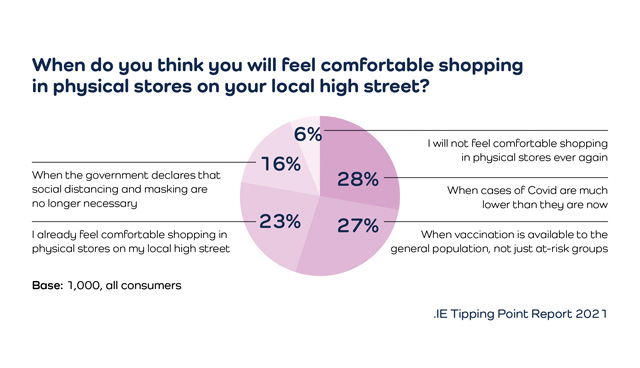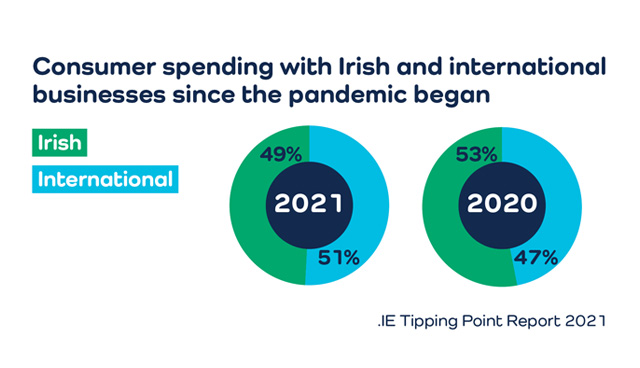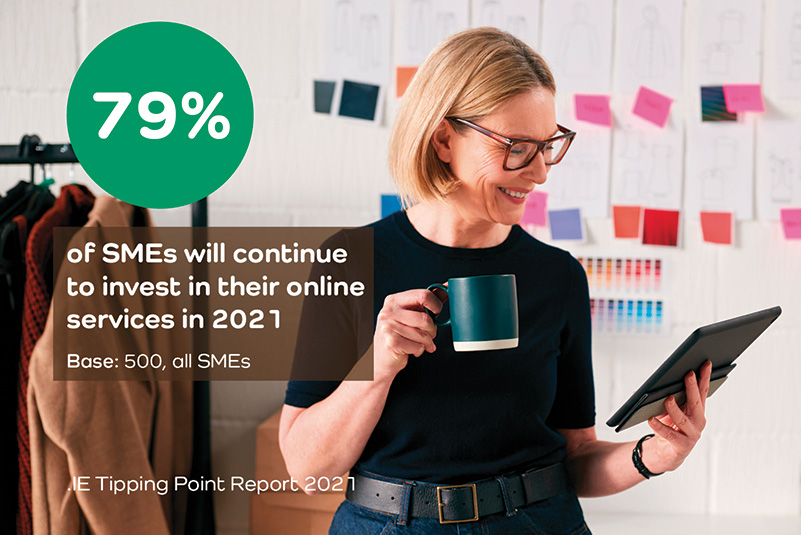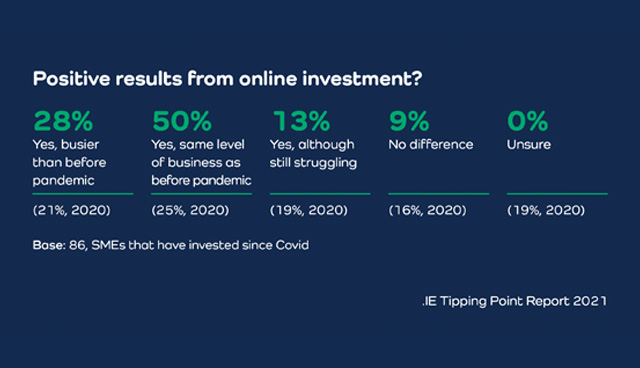Many consumers won’t feel comfortable shopping on high street until Covid is better controlled

The .IE Tipping Point report, Irish e-commerce and digital business in the Covid vaccine era, is the second report analysing consumer and SME behaviour and attitudes since the pandemic, writes David Curtin, CEO of .IE, the company that manages .ie domains, the preferred online identity for business in Ireland.
While vaccines offer Ireland a way out of lockdown, until a critical mass is reached and the population is immunised, our economy and society are set to remain in a state of flux. This flux is accelerating major trends in e-commerce and digitalisation. Behaviours and ways of working that boost sales, cut costs or increase convenience are likely to become permanently ingrained.
Key findings
The vaccine era but no return to normal
While vaccines have laid down a path back to normality, all government and medical advice suggests that economic restrictions and social distancing requirements are likely to remain in place until at least the end of 2021. Consumers seem to be mostly on the same page. 55 per cent believe that life in 2021 will be mostly the same as life in 2020 or even more restricted.

The Covid consumer
The way Irish consumers spend online and in-store is changing. 68 per cent of Irish consumers said they spent more online in 2020 than they did in 2019. A sizeable 42 per cent say they will do most of their shopping in physical, bricks-and-mortar stores in 2021, despite the current restrictions, down from 48 per cent in 2020. Greater numbers say they will shop only for necessities in-store but buy most other products online (43 per cent vs 41 per cent) or do most of their shopping online (15 per cent vs 11 per cent).
These changes reflect the current state of the pandemic. The longer compulsory online shopping continues, the more entrenched it will become in consumer behaviour.

While consumers are keen to support local businesses during the pandemic (this number has risen from 67 per cent to 74 per cent among majority SME shoppers) international businesses continue to prove attractive. Cheaper prices, better product ranges and superior online storefronts were key factors driving behaviours among those that have done most of their shopping with international businesses.
However, consumer behaviour still implies competitive advantages for Irish SMEs. Solidarity and patriotism aside, many consumers think Irish businesses are faster and more reliable, more trustworthy (which jumped to 48 per cent, up from 41 per cent) and have better order tracking and delivery. With investment in a modern, e-commerce website, Irish SMEs can also win over consumers who are simply seeking a straightforward and convenient online experience.

The Covid SME
An increasing proportion of businesses recognise that a digital channel is key to their survival while the pandemic continues. 30 per cent of SMEs now claim to sell their products via an online store, up from 25 per cent in 2020.
Those SMEs with an online store have benefited from consumers spending more online. 86 per cent say they have experienced an increase in sales or sales enquiries from their online store since the pandemic began.

The number of Irish SMEs that have invested in their online presence has grown remarkably: 55 per cent have invested since the beginning of the pandemic, up from just 21 per cent in 2020. Because of this investment, 78 per cent of SMEs say they have been able to sustain pre-Covid levels of business or are busier than before, up from 46 per cent in the summer of 2020.
It is therefore unsurprising that most fully intend to continue investing in their online presence in 2021. 61 per cent believe that their online presence will be more important to their business this year than last.
Insights
- Buying Irish isn’t enough
More consumers who reported doing the majority of their online shopping with Irish SMEs said they did so out of a desire to help local businesses through the pandemic. However, crisis solidarity is not enough for a stable e-commerce strategy. Irish SMEs seeking to sustain sales through their online store can only retain their customers by consistently improving the online customer experience. - Play to your strengths
Multinationals with globalised supply chains can be more competitive on price and range. However, Irish SMEs still have competitive USPs, such as trust and reliability. They need to focus on perfecting these advantages, for example, with personalised customer communications or faster delivery services, so that shopping local continuously generates benefits and value-adds for their customers. - Brexit: advantage Ireland?
The UK’s withdrawal from the EU may provide local businesses with some advantages which SMEs should seek to exploit. Because many Irish SMEs ship goods entirely within Ireland, they can pass on cost benefits to consumers, who will not have to pay unforeseen customs charges. Delivery from within Ireland is also faster. Future trends: Short- and medium-term trends with the potential to shape the future of digital Ireland. - Omni-channel is preferred
Consumers are spending more online and intend to keep doing so. Their in-store shopping routines have changed over the last year, and many now favour visiting shops at a certain time of the week, when they view them as safer or less crowded. This may help to accelerate a long-observed trend that suggests consumers now prefer to buy necessities online during the week, the ‘midweek convenience’, and save discretionary purchases for the weekend ‘experience’. If this behaviour becomes more apparent, bricks-and-mortar SMEs that have invested in an online store since lockdown will have a major advantage over their offline competitors after the pandemic. - Virtual service delivery
Services are still purchased only infrequently online by consumers. This may be because many Irish professional services firms have not yet invested in the tools or methods required to make the consumer experience useful and seamless. Service providers should therefore begin by undertaking an internal assessment of their use and deployment of technology, and whether it is fit for purpose. - No way back
From a digital perspective, it is clear that the pandemic is having an accelerant effect. What we view as Ireland’s digitalisation tipping point may, therefore, be an accelerating downward spiral for those who fail to adapt as e-commerce and online interaction become the default. Local authorities and national decision-makers must consider these factors if their digital development plans are to be effective and relevant.
E: marketing@weare.ie
W: www.weare.ie
Research was conducted in January 2021 by Core Research with 1,000 Irish consumers and 500 retail and customer-facing professional services SMEs. The .IE Tipping Point Report was prepared in partnership with Digital Business Ireland.






